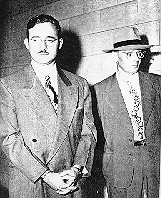Julius Rosenberg was born on May 12, 1918 in New York City. He was the son of Polish immigrants. His father Harry worked in the garment industry and his mother Sophie took care of the couple's five children. As a boy, Julius attended Downtown Talmud Torah and then Seward Park High School where he graduated at 16. Although his father hoped Julius would become a rabbi, Julius enrolled at the City College of New York to study electrical engineering.
In college, Julius also pursued his interest in politics, joining the Steinmetz Club, the campus branch of the Young Communist League. There he would meet Morton Sobell, William Perl, and Joel Barr. Julius also became a member of the Federation of Architects, Engineers, Chemists, and Technicians (FAECT), a rather radical union for professionals. Julius Rosenberg became so engrossed in his political activities that his studies began to languish. Rosenberg graduated in 1939, but was one semester behind the rest of his class. Later that same summer, Julius married Ethel Greenglass.
After leaving college, Julius did freelance work until the fall of 1940 when he was hired as a civilian employee of the U.S. Army Signal Corps. Julius was promoted in 1942 to the position of inspector. The new position allowed the Rosenbergs to move to a new three bedroom apartment. Around this same time, Julius and Ethel became full members in the American Communist Party. Julius was the chairman of Branch 16B of the Party's Industrial Division and held its meetings at the Rosenbergs' apartment. By 1943, however, the Rosenberg's dropped out of the Communist Party to pursue his espionage activities.
Early in 1945 Rosenberg was fired from his job with the Signal Corps when his past membership in the Communist Party came to light. Julius took a job with the Emerson Radio Corporation for a while and then in 1946 formed G & R Engineering Company with David Greenglass, Bernard Greenglass, and Isadore Goldstein. But this small machine shop was never a success. On June 17, 1950, Julius Rosenberg was arrested on suspicion of espionage after having been named by David Greenglass. Julius Rosenberg stoically maintained his innocence throughout the length of his trial and appeals. On June 19, 1953, Julius Rosenberg was executed at Sing-Sing Prison in New York.

